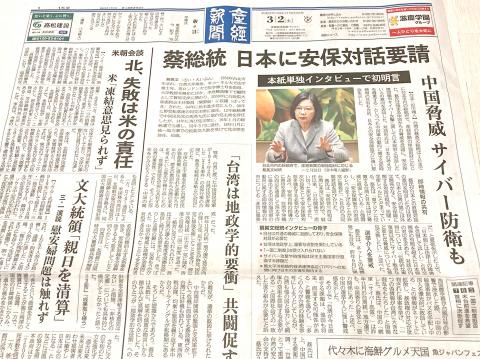President Tsai Ing-wen (蔡英文) has for the first time expressed intent to conduct direct dialogue with the Japanese government on cybersecurity and regional security issues.
Tsai said in an interview published by Japan’s Sankei Shimbun yesterday that she would “respect Japan’s opinion” regarding how such dialogue should be held.
Japanese Prime Minister Shinzo Abe has proven “very friendly” toward Taiwan since assuming office, making significant decisions toward improving Taiwan-Japan relations, said Tsai, who used the interview as an opportunity to express her gratitude to Abe.

Photo: CNA
Japan last year backed Taiwan when it was refused access to the World Health Assembly as an observer and a meeting of the International Civil Aviation Organization, she said.
Meanwhile, it is important for Taipei and Tokyo to share information in real time about Chinese People’s Liberation Army (PLA) movements, as the PLA Navy and PLA Air Force must pass by Okinawa or Taiwan to enter the Western Pacific, Tsai said.
As Taiwan and the Ryukyu Islands form part of the first island chain, the nation should emphasize its necessity in terms of geopolitics, especially in what could develop into a “second cold war” between the US and China, she said.
For the sake of regional peace and stability, Tsai said that Taiwan would not antagonize China and would handle cross-strait relations carefully.
However, she said that “when we must make something clear, we will not hesitate to tell China — and the world — explicitly.”
She cited as an example Chinese President Xi Jinping’s (習近平) proposal in a speech on Jan. 2 to create a Taiwanese version of Beijing’s “one country, two systems” framework, saying that Taiwan stood its ground by telling China and the world that such a system was not acceptable.
She called on Japan to “overcome legal obstacles” and seek pragmatic and active collaboration with Taiwan, despite the absence of official diplomatic ties.
Tsai expressed cautious optimism about a Taiwan-US summit, although she did not directly answer whether, if such an event happened, she would be invited to speak before the US Congress or meet with US President Donald Trump.
She also expressed Taiwan’s hope to join the Comprehensive and Progressive Agreement for Trans-Pacific Partnership, saying that the nation’s economic performance would benefit signatories of the trade deal.
Commenting on the passage of a referendum in November last year to uphold a ban on food imports from Japan’s Fukushima, Ibaraki, Gunma, Tochigi and Chiba prefectures, Tsai said that Taiwan hopes its passage would not affect Taiwan-Japan trade and relations.
Taiwan hopes to open dialogue with Japan and jointly seek a resolution to the issue that would comply with the spirit of WTO regulations on trade disputes while also respecting domestic law, she said.
Taiwan must elicit more international support and build a community in which values, trade and defense are freely shared, Tsai said, adding that the nation should let its friends in the international community understand the importance of its continued existence.

NO HUMAN ERROR: After the incident, the Coast Guard Administration said it would obtain uncrewed aerial vehicles and vessels to boost its detection capacity Authorities would improve border control to prevent unlawful entry into Taiwan’s waters and safeguard national security, the Mainland Affairs Council (MAC) said yesterday after a Chinese man reached the nation’s coast on an inflatable boat, saying he “defected to freedom.” The man was found on a rubber boat when he was about to set foot on Taiwan at the estuary of Houkeng River (後坑溪) near Taiping Borough (太平) in New Taipei City’s Linkou District (林口), authorities said. The Coast Guard Administration’s (CGA) northern branch said it received a report at 6:30am yesterday morning from the New Taipei City Fire Department about a

IN BEIJING’S FAVOR: A China Coast Guard spokesperson said that the Chinese maritime police would continue to carry out law enforcement activities in waters it claims The Philippines withdrew its coast guard vessel from a South China Sea shoal that has recently been at the center of tensions with Beijing. BRP Teresa Magbanua “was compelled to return to port” from Sabina Shoal (Xianbin Shoal, 仙濱暗沙) due to bad weather, depleted supplies and the need to evacuate personnel requiring medical care, the Philippine Coast Guard (PCG) spokesman Jay Tarriela said yesterday in a post on X. The Philippine vessel “will be in tiptop shape to resume her mission” after it has been resupplied and repaired, Philippine Executive Secretary Lucas Bersamin, who heads the nation’s maritime council, said

REGIONAL STABILITY: Taipei thanked the Biden administration for authorizing its 16th sale of military goods and services to uphold Taiwan’s defense and safety The US Department of State has approved the sale of US$228 million of military goods and services to Taiwan, the US Department of Defense said on Monday. The state department “made a determination approving a possible Foreign Military Sale” to the Taipei Economic and Cultural Representative Office in the US for “return, repair and reshipment of spare parts and related equipment,” the defense department’s Defense Security Cooperation Agency said in a news release. Taiwan had requested the purchase of items and services which include the “return, repair and reshipment of classified and unclassified spare parts for aircraft and related equipment; US Government

More than 500 people on Saturday marched in New York in support of Taiwan’s entry to the UN, significantly more people than previous years. The march, coinciding with the ongoing 79th session of the UN General Assembly, comes close on the heels of growing international discourse regarding the meaning of UN Resolution 2758. Resolution 2758, adopted by the UN General Assembly in 1971, recognizes the People’s Republic of China (PRC) as the “only lawful representative of China.” It resulted in the Republic of China (ROC) losing its seat at the UN to the PRC. Taiwan has since been excluded from